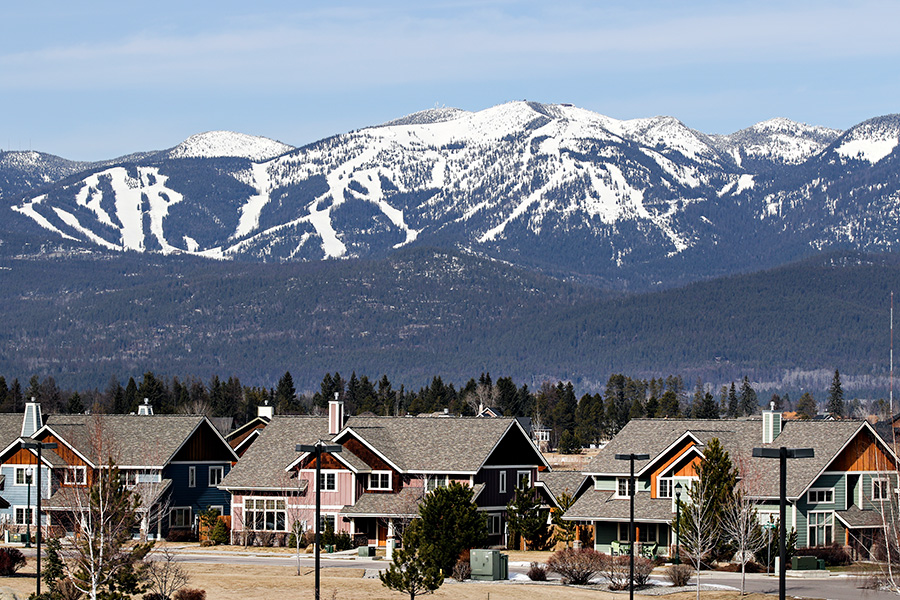A proposed affordable housing apartment complex on Edgewood Place in Whitefish received $6.75 million in federal tax credits on Nov. 19, providing a catalyst to help the city grow its inventory of affordable housing.
The Montana Board of Housing awarded a total of $30.6 million federal tax credits to projects in Billings, Havre, Helena, Ronan, and Whitefish, with board members identifying the latter as having among the most pressing needs to build out its stock of affordable housing and deserving the tax credits.
Federal housing credits allow developers to borrow less money for construction and pass those savings along to families and individuals through lower rent. Federal tax credits fund the construction or rehabilitation of approximately 220 rental homes in Montana each year. Over the past five years, they have created an annual average of approximately 608 jobs, $27.3 million in local wages and more than $2.4 million in new taxes and revenues for local governments.
After previously narrowing down the applications to eight finalists, the governor-appointed Montana Board of Housing voted on the final allocation. The Montana Board of Housing is part of Montana Housing at the Department of Commerce.
Gov. Steve Bullock said allocating the credits to the five communities to preserve or construct new affordable housing is a “win-win” for Montana.
“Montana families thrive when they have a safe and affordable place to call home, and our economy continues to grow when we are able to house a productive workforce, while creating hundreds of construction jobs in local communities throughout the state,” Bullock said.
With the tax credits, the Whitefish Housing Authority is partnering with the Missoula-based nonprofit Homeword, Inc., and is proposing a new construction project of 38 units for families. The total project investment of $8,708,814 will result in 117 Montana jobs earning $5.2 million in wages and salaries supported by construction activity, according to the Montana Housing Authority.
Heather McMillin, Housing Development Director, wrote in a letter to the board that the affordable housing shortage plaguing Whitefish is “stifling economic growth” and diminishing the community’s number of full-time residents, particularly as homes become out of reach for locals and are transformed into short-term vacation rentals.
The property for the development on Edgewood Place off of Wisconsin Avenue approaching City Beach once housed a mobile home park, but now sits mostly vacant. The property’s owners, Alan and Lisa Stinson, have agreed to sell it to the Whitefish Housing Authority for affordable development.
According to a workforce housing needs assessment released in December 2016, middle-income, working-class Whitefish residents have limited options when it comes to finding comfortable, cost-effective living arrangements, a problem that is displacing locals and forcing them to live outside their chosen community — 56 percent of Whitefish’s workforce lives in neighboring communities, 34 percent of whom would prefer to live in Whitefish.
Seasonal workers face a scarce rental inventory, while homeownership remains out of reach for young professionals looking to enter an outsized market that towers above the average household income.
The tax credits mark the first time in 16 years that Whitefish has been on the receiving end of the Montana Board of Housing, which in 2002 awarded funds for a 10-unit family property.
In January 2016, the Whitefish Housing Authority narrowly missed out on $6.7 million in tax credits to build a 36-unit affordable housing complex on U.S. Highway 93 South, just north of Les Schwab Tires.
The Montana Board of Housing in Helena heard requests for federal tax credits for 19 affordable housing projects across the state totaling $87.8 million. With only $26.9 million in federal tax credits available to build or rehabilitate rental housing for low- to moderate-income residents, however, only eight of the applicants were awarded tax credits.
Spearheaded by the Portland-based Common Wealth Companies, the proposed project would have added 36 affordable housing units to the community, with second-phase plans that would have included an additional 36 units. However, the project was contingent on receiving the tax credits.
As executive director Lori Collins put it at the time, losing out on the credits made for a “very sad day,” but was testament to affordable housing as a statewide problem that demands solutions.
